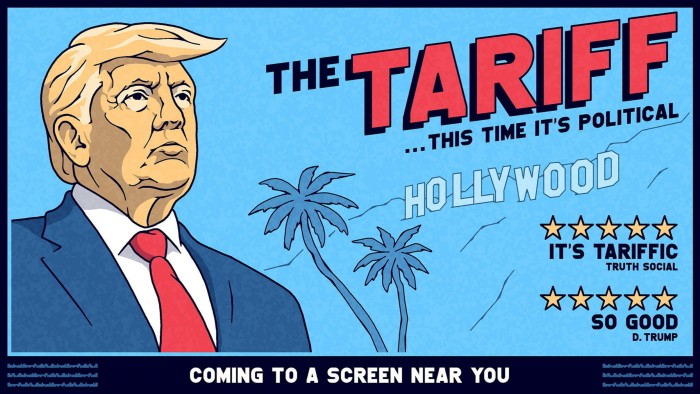Unlock the White House Watch newsletter for free
Your guide to what Trump’s second term means for Washington, business and the world
Maga has always been about manufacturing. Donald Trump talks about bringing back production lines to the Midwest because so many of the economically precarious voters most open to his message were laid-off factory workers in old production-line industrial towns.
But last week, the president started talking about tariffs not on steel, but on foreign-made films. He now wants to “Make Hollywood Great Again” by pushing companies to produce more films in the US.
At first glance, the idea that the film business needs protecting seems bonkers. America is the world’s top exporter of films. The majority of Hollywood revenue comes from overseas audiences that lap up US action films, thrillers and animated blockbusters. Movies are a huge part of American soft power. Given all this, tariff protection for Hollywood has prompted the usual dismissive scepticism from liberals (and many conservatives) who believe most of what the president does is nuts.
They are wrong. Like so many Trump ideas, the idea may be flawed economically, but it’s smart politically. Hollywood is a big union town and close to Orange County, which is a hotbed for Maga. Just as Pennsylvania steel workers and Indiana machinists were put in a more precarious position by the China shock, Tinseltown is feeling anxious not only about cheap foreign competition, which has been taking production work away from Los Angeles for years, but about job-displacing technologies such as artificial intelligence that will fundamentally shift the entire business model of the industry.
To capitalise on this, Trump is offering up his usual prescription: you are anxious about the future, I’ll offer you a solution that probably won’t work economically (retaliatory tariffs would cause little pain overseas while hurting Los Angeles) but will make you feel cared for politically. In true conman style, he has grasped the nugget of truth: content, media and coding are ground zero for a new “precariat” class of service workers who worry their future opportunities will be far less rich than those of the past.
These are exactly the sort of people most likely to be lured in by the hard right. As a body of academic research has shown, while outright poverty may decrease support for far-right populism, middle-class voters worried about the future tend to be drawn to it, and its false promises of better opportunities. This “shrinking and shouting” precariat leans far right in the US, as well as many European countries.
Trump isn’t the only one talking about the precariousness of Hollywood jobs. California’s governor, Gavin Newsom, has proposed much larger tax credits for the industry to try to bring back work for middle-class labour in the film business — the camera operators, electricians, make-up artists and others who have been displaced by foreign counterparts as production has moved to where labour is cheaper, and audiences are bigger.
But these jobs are vulnerable to technology as well — better digital equipment means you don’t need as many people running around with cameras, and filters can do the work of cosmeticians in some cases. What’s more, technological disruption also threatens work higher up the creative food chain.
Media, content and coding — all top California industries — are the ones being most quickly disrupted by AI. This was at the heart of the 2023 labour battles waged by Hollywood writers and actors. It wasn’t so much about salaries and benefits as how intangible assets and intellectual property such as story ideas or digital images and voices are used by companies, how much control workers have over things like AI, and how the wealth from all this is shared.
Intangible assets — software, patents, digital data, trademarks and other IP — represent about 80 per cent of the value on big companies’ balance sheets. This makes sense given that we live in a services economy increasingly dependent on digital data. The percentage of wealth that lives in IP will only grow.
Hollywood is more dependent on intangible assets than most sectors. Many actors got their start in films, along with union membership (and thus benefits such as healthcare), through a few stints as an extra. But digital imagery is now eliminating much of that work. And many writers are being replaced, not just augmented, by ChatGPT.
Media may be on the front end of the disruption, but law and healthcare aren’t far behind. There will be many places around the country beyond Hollywood where Trump can cultivate a larger political base with promises to keep foreigners and automation away. I could imagine him putting a ban on foreign radiologists reading US X-rays, or taking aim at big law firms that hire virtual research associates. The truth about what helps or hurts people economically isn’t necessarily important here. It’s about political optics.
So, as Democrats are increasingly buying into an “abundance” agenda focused on regulatory reform and not that dissimilar to the neoliberal policies of the 1990s, cementing themselves as the party of the privileged, Trump is cultivating a new group of anxious workers, this time in services. It’s so clever. And problematic. While the Maga manufacturing line appeals mainly to a small pool of manual labourers in a handful of swing states, the service sector represents 79 per cent of the US workforce. Precarious politics indeed.
Read the full article here




